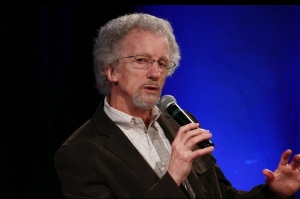How can we become more optimistic?

Residents in Olten, Switzerland, woke up Friday morning in a town coated in chocolate powder. A resident tweeted in response: “Finally 2020 delivers!”
There was a defect in the cooling ventilation for a line of roasted cocoa in the Lindt & Sprüngli factory. High winds combined with this ventilation error resulted in the spread of chocolate powder across the area. Local residents were suitably grateful.
Here’s another headline that caught my eye: “Texas Teenagers Dressed as Superheroes Visit Kids While Collecting Food Donations.” Twin eighteen-year-old brothers in Pearland, Texas (south of Houston) have been visiting children in their area while wearing Spider-Man costumes. They have visited about three hundred homes so far and donated 4,500 pounds of food.
Consider one more example of good news in the news: a church in Brownsville, Texas, has been providing food to hundreds of vulnerable families and individuals each week during the coronavirus pandemic. The church averages sixty in attendance, but its crucial ministry proves that a small light is powerfully visible in a dark room (cf. Matthew 5:16).
The power and pathway of optimism
I was motivated to cite these positive stories by an article in the Washington Post titled, “Why Some People Are More Optimistic than Others—and Why It Matters.” The article cites studies indicating that people who are more optimistic have a reduced risk of cardiovascular disease. They are less likely to have heart attacks or strokes and are less likely to die from cardiovascular-related issues.
The reason: optimistic people tend to engage in healthier behaviors such as eating fruits and vegetables, exercising regularly, and not smoking. Optimism has also been linked to happy romantic relationships, fewer sick days, lower levels of pain, and a reduced likelihood of becoming cognitively impaired. In addition, optimistic people tend to work harder, expect to retire later, and save more money.
So, here’s the question: How can we become more optimistic?
One answer is to hope for things to change. Like the residents of Olten, we might wake up one day to a chocolate shower, metaphorically speaking.
A better answer is to be the change we want to see in the world. If children need food and encouragement, put on a Spider-Man costume (so to speak) and visit them. Like the church in Brownsville, decide to make a difference in the world that is much larger than your place in the world.
You will begin to see the world you want to see. You will be optimistic about tomorrow, because you are building it today.
As leadership expert Peter Drucker noted, “You cannot predict the future, but you can create it.”
“God is a refuge for us”
But there’s more to the story than trying harder to do more. Our greatest source of optimism lies not in our self-reliant ability to create the future but in our confidence in the One who will.
I read a Psalm every morning as part of my personal Bible study. Today, I found David’s testimony in Psalm 62 to be especially poignant: “For God alone, O my soul, wait in silence, for my hope is from him. He only is my rock and my salvation, my fortress; I shall not be shaken. On God rests my salvation and my glory; my mighty rock, my refuge is God” (vv. 5–7).
David then invites us to join him: “Trust in him at all times, O people; pour out your heart before him; God is a refuge for us” (v. 8).
We are not to trust in ourselves, no matter our cultural status: “Those of low estate are but a breath; those of high estate are a delusion; in the balances they go up; they are together lighter than a breath” (v. 9).
Rather, we are to trust in this revelatory fact: “Once God has spoken; twice have I heard this: that power belongs to God, and that to you, O Lord, belongs steadfast love” (vv. 11–12).
A prayer I invite you to share
Trying harder to do better is much better than the alternative. Optimism in pessimistic times is often the result of such transformational activism.
But the best option is to trust God and then work in his leading and power. We can make an eternal impact on our temporal culture if we live and serve in such omnipotence (cf. Zechariah 4:6).
To that end, let’s close with this testimony from Henri Nouwen: “I know that true joy comes from letting God love me the way God wants, whether it is through illness or health, failure or success, poverty or wealth, rejection or praise. It is hard for me to say, ‘I shall gratefully accept everything, Lord, that pleases you. Let your will be done.’ But I know that when I truly believe my Father is pure love, it becomes increasingly possible to say these words from the heart.”
Nouwen then quotes a prayer by Charles de Foucauld that expresses the spiritual attitude he seeks:
Father, I abandon myself into your hands,
do with me what you will.
Whatever you may do, I thank you;
I am ready for all, I accept all.
Let only your will be done in me, and in all your creatures.
I wish no more than this, O Lord.
Into your hands I commend my soul;
I offer it to you with all the love of my heart,
for I love you, Lord, and so need to give myself,
to surrender myself into your hands without reserve,
and with boundless confidence, for you are my Father.
I made his prayer my own this morning. Will you join me?
Originally posted at denisonforum.org



























